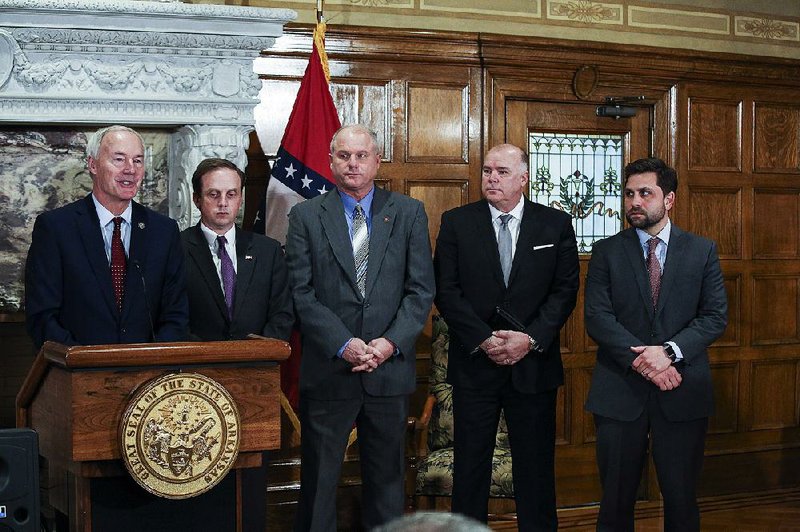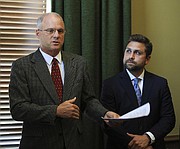The introduction of Gov. Asa Hutchinson's latest plan to reduce state individual income taxes should allow lawmakers to turn their attention to other key priorities, including developing a plan to raise more revenue for highways, legislative leaders say.
"Now I am going to begin to start on focusing on getting the highway people to come to some sort of consensus because that is really the next big issue that we have got to resolve," said Senate President Pro Tempore Jim Hendren, R-Sulphur Springs.
"I think the path is pretty well charted on taxes now, if we can be successful at it. But we have got to do the same thing on highways," he said.
House Speaker Matthew Shepherd, R-El Dorado, said that moving forward with the governor's tax-cut plan "is going to allow us to look more closely at highways and [proposed] constitutional amendments because the tax-cut issue seemed to be kind of the A1 issue for this session."
In his re-election campaign, Hutchinson vowed to work with lawmakers to develop a plan to raise more money for highways, and he said he preferred to refer the plan to voters. Thus far, he has said that he favors including a permanent extension of the state's half-percent sales tax for highways, originally approved in 2012 for a 10-year period.
Senate Revenue and Taxation Committee Chairman Jonathan Dismang, R-Searcy, who introduced the Republican governor's income-tax plan as Senate Bill 211 on Wednesday, said the committee will consider that bill at 11 a.m. today at the state Capitol.
[RELATED: Complete Democrat-Gazette coverage of the Arkansas Legislature]
The bill would cut the top individual income-tax rate from 6.9 percent to 5.9 percent.
With Republican legislative leaders at his side Wednesday, Hutchinson unveiled what he dubbed his "5.9 plan," which state Department of Finance and Administration officials project will reduce state revenue by almost $97 million a year when fully implemented over two years.
The bill will require at least 27 votes in the 35-member Senate to be sent to the House for further consideration. That's because the bill would increase individual income-tax rates on some taxpayers. Hendren said it's "absolutely certain" that no one will pay more taxes under the bill. It also will require 75 votes in the 100-member House.
"We have got positive feedback, from what I believe, to be enough members to get there, but you never know until that actual vote is called," Dismang said Thursday. The Senate has 26 Republicans and nine Democrats.
Sen. Larry Teague, D-Nashville, who is vice chairman of the Senate committee, said Thursday that he plans to vote for SB211.
"Personally, I like it better than what we had [because it would have] less impact on the budget," said Teague, who also is a co-chairman of the Joint Budget Committee. Hutchinson's previous plan was projected by state finance officials to ultimately reduce state tax revenue by nearly $192 million a year.
"You always worry about having the money to fund our operations," Teague said.
PLAN PRAISED
State officials project the latest tax-cut plan would reduce revenue by $25.6 million in fiscal 2020, which starts July 1, and then another $48.5 million in fiscal 2021 and $22.9 million more in fiscal 2022.
It would be the third income-tax cut since Hutchinson took office in 2015.
In 2015, the Legislature enacted Hutchinson's plan to cut individual income-tax rates for people with between $21,000 and $75,000 in taxable income; state officials project the plan will reduce state tax revenue by about $100 million a year.
In 2017, the second cut was enacted, this time for people making less than $21,000 a year in taxable income. That plan trims revenue by about $50 million a year, officials said.
Ryan Norris, Arkansas director of Americans for Prosperity, last week welcomed the latest proposal.
"We applaud Gov. Hutchinson making good on his promise to provide income tax relief to all Arkansans. Arkansas has benefited from a pro-growth tax code and Arkansans are reaping the benefits. We look forward to working with the governor and legislature to double down on good tax policy with rates that are low, flat, and fair," Norris said in a written statement.
Founded by businessman and political activist David Koch in 2004, Americans for Prosperity is a nonprofit advocacy group.
Hutchinson said his "5.9 plan" would restructure the upper-income tax table with three rates instead of the current six rates and trim the top rate for the middle-income tax table.
The current top rate of 6.9 percent applies to people with at least $79,300 a year in 2018 taxable income.
The top rate would be cut to 6.6 percent, effective Jan. 1, 2020, and then to 5.9 percent, effective Jan. 1, 2021, under this plan.
The upper-income tax table starts at $80,500 a year. In addition, in the middle-income tax table -- for people who make from $22,500 to $80,500 a year -- a 5.9 percent rate, rather than the current 6 percent rate, would be applied to the portion of income that is at least $37,500 a year.
Hutchinson said his proposed tax cut would make the state more competitive across the nation in recruiting industry, capital and talent, and he said he was confident in the finance department's projections.
IMPACT DISPUTED
But Bruno Showers, senior policy analyst at Arkansas Advocates for Children and Families, said the ultimate costs of Hutchinson's proposed income-tax cut are likely to be significantly higher than the finance department's estimate of about $97 million a year.
"When modeled at 2019 income levels (instead of 2016 income levels the DFA used) estimates of the cost of the fully-phased[-in] tax cut comes in at $157 million annually, according to the Institute on Taxation and Economic Policy," Showers wrote on the organization's blog. "Because the proposed tax cut is directly tied to the incomes of upper-income taxpayers (incomes > $200,000), the cost of the governor's proposal is going to increase as incomes of the wealthiest Arkansans do."
Arkansas Advocates for Children and Families was founded in 1977 by a group of prominent Arkansans, including Betty Bumpers, the wife of former Gov. and U.S. Sen. Dale Bumpers, and Hillary Clinton, wife of then-Attorney General Bill Clinton.
Lisa Gee, a senior policy analyst for the Institute on Taxation and Economic Policy in Washington, D.C., said Thursday in an interview that she projected the governor's income-tax cut would reduce state revenue by $157 million a year based on projections for 2019 income. She forecast it would cut revenue by about $120 million a year using the 2016 tax returns that the finance department did.
Scott Hardin, a spokesman for the finance department, said Friday that the department "developed the revenue impact based on the most recent, real-world data available, which is actual tax returns filed by Arkansans."
"As DFA has determined the impact of the Governor's past income tax cuts, it is evident that this system results in the most accurate possible projection," he said in a written statement. "We look forward to receiving feedback and answering questions as this strengthens the process."
OTHER TAXES
Hendren, who is a co-chairman of the Arkansas Tax Reform and Relief Legislative Task Force, said that also to be filed soon are other bills of the task force, including some on corporate income taxes.
According to general revenue projections provided by the governor's office for fiscal 2020-22, the governor's office has forecast a $28.5 million reduction in state revenue from corporate tax changes in fiscal 2021 and another $28.5 million reduction in fiscal 2022. Fiscal years begin July 1.
The projections refer to extending the five-year period for businesses to carry forward their net operating losses, eliminating the "throwback rule" for multistate business income and using a single sales factor in the apportionment formula for taxing multistate business income. The "throwback rule" is part of the calculation used by Arkansas for the apportionment of income by multistate businesses for income-tax purposes.
These changes in the corporate income-tax code are part of the tax overhaul task force's wide variety of recommendations. The task force recommended incrementally increasing the carry-forward period for businesses on their net operating losses from five years to 20 years.
Sen. Keith Ingram, D-West Memphis, has introduced Senate Bill 196 to provide tax incentives for private investment in the state's 85 "opportunity zones" in low-income communities by adopting federal Internal Revenue Service provisions regarding them. Hendren said the tax overhaul task force has recommended that legislation.
Hendren said he's still trying to assess whether there is any legislative desire to rectify another issue -- that the state doesn't collect enough in tobacco taxes to cover tobacco-related medical costs paid by taxpayers.
The state collected about $230 million in tobacco taxes in 2017, the most recent calendar year for which the finance department has complete information, according to Hardin.
Hendren said a cigarette-tax increase requires a three-fourths vote in the Senate and House.
"That's a heavy lift," he said. "Tobacco companies have a lot of influence in politics at the state and national level, but I have raised the issue and I am going to continue to ask questions as we start talking about how we are going to pay for other needs of state government, whether it be highways or other things.
"I haven't seen any legislation and I know there is a lot of interest in vaping about a potential source of revenue. It is really hard to explain why something that has so many potential health hazards and addictions to nicotine, particularly for kids, is not taxed at all except for sales tax," Hendren said.
Hardin, in an email, said that if taxed at 40 percent, "vaping and related products would result in approximately $7 million in new revenue annually."
Sen. Missy Irvin, R-Mountain View, and others are reviewing potential options for raising $10 million to $20 million a year for the University of Arkansas for Medical Sciences' Winthrop P. Rockefeller Cancer Institute to establish and maintain a National Cancer Institute-designated cancer center.
The Rockefeller institute is committed to raising at least $30 million in private funds to support the pursuit of achieving National Cancer Institute status, according to Irvin's Senate Bill 151. The bill would create the UAMS National Cancer Institute Designation Fund. The legislation cleared the Senate Public Health, Welfare and Labor Committee on Wednesday and then was sent back to the committee to be amended.
"We are looking at all funding sources," said Irvin. "All options are on the table."
REORGANIZATION STATUS
Rep. Andy Davis, R-Little Rock, has now filed 15 of the 16 bills that would implement Hutchinson's plan to reduce the number of state agencies reporting to him from 42 to 15.
The latest bills that he has filed spell out the details for merging various state entities into the Cabinet-level Department of Labor and Licensing (House Bill 1305), Department of Education (House Bill 1361) and Department of Finance and Administration (House Bill 1360).
Davis said he hopes to soon file the bill on the Cabinet-level Department of Commerce.
He said he expects the Senate and House State Agencies and Governmental Affairs committees to continue reviewing the bills.
"It will probably be two more weeks before we get a final [consolidated] bill ready to file," he said.
The Arkansas Farm Bureau recently announced its support for House Bill 1117, on the Cabinet-level Department of Agriculture.
"We are hopeful that the bill would not be amended or adjusted in a way that would conflict with our policy," said Randy Veach, president of the Farm Bureau.
SundayMonday on 02/04/2019



